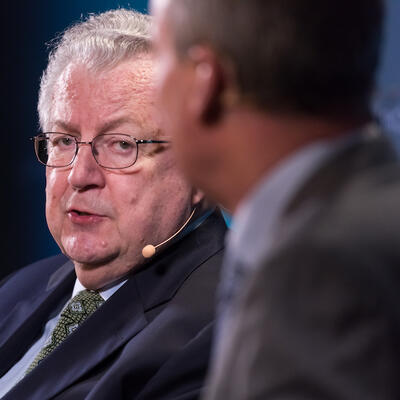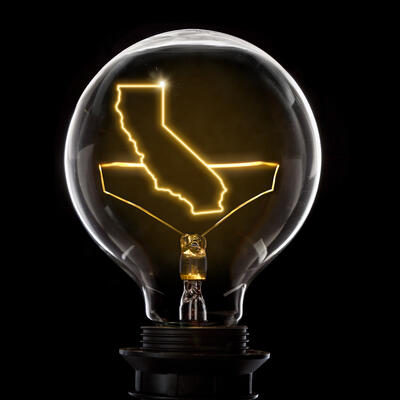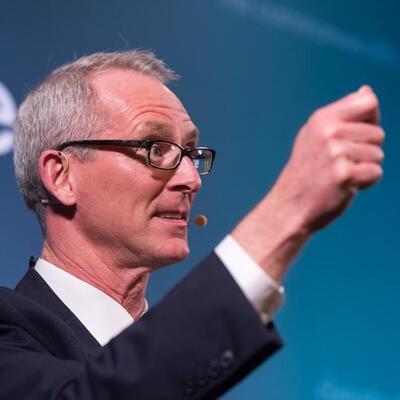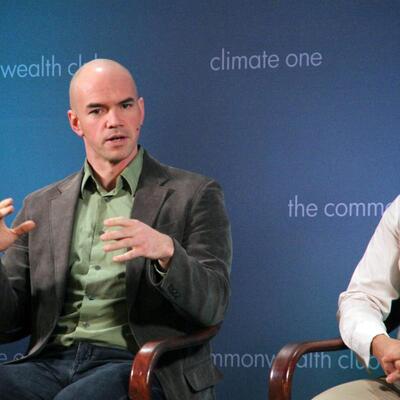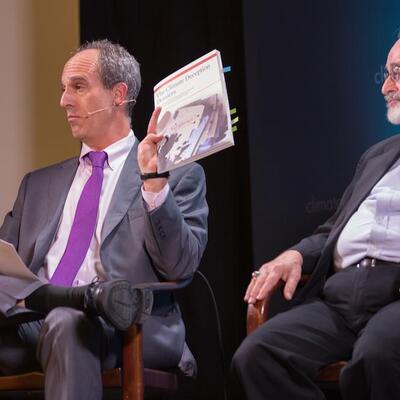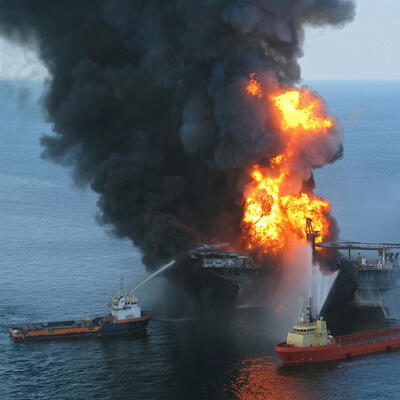
A Decade of Oil: From Deepwater Horizon to Deflation
Guests

John Hofmeister
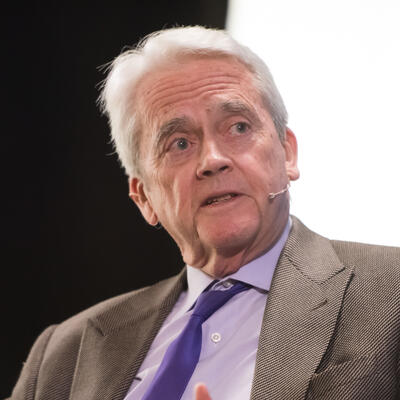
William K. Reilly

Heather Richards
Summary
America's latest oil boom began with a bang, literally, on Earth Day, 2010. That’s when an offshore oil rig owned by BP exploded, killing eleven workers and spilling nearly five million barrels of oil into the Gulf of Mexico. John Hofmeister, co-founder of Citizens for Affordable Energy, was in Washington D.C. at the time.
“I remember hearing about the explosion and seeing flames coming off the platform from the TV that was nearby,” Hofmeister recalls. “And I said, oh not again.”
What did he mean by that? Hofmeister had been president of Shell Oil during both the 2005 Texas City Refinery explosion and the Prudhoe Bay pipeline leaks in 2006. Both facilities were owned by BP at the time of the disasters.
“It just seems to me that something is deadly wrong inside that company,” Hofmeister remembers thinking.
Bill Reilly was on the board of Conoco Phillips at the time, and later co-chaired the commission that investigated the spill.
The more that we inquired into the circumstances that led to it,” Reilly says, “the more it was a case of not just one thing went wrong. A whole series of things went wrong.”
Tragic as it was, that 2010 event coincided with the start of a decade-long boom in U.S. oil production. That is largely due to the spread of fracking technology, helped along by administrations that have kept the cost of oil leases low. Today, the U.S. leads the world in oil production, surpassing both Russia and Saudi Arabia. But it hasn’t all been good news for the fossil fuel industry. A gradual global move away from coal and oil are threatening their bottom line. Not only that - the COVID-19 crisis has shown many Americans that reducing our commute - and our gasoline consumption - could be the wave of the future.
“CEOs always were of the opinion that working at home is not efficient; you couldn’t really trust people do it,” says Reilly. But that’s no longer the case. “They're astonished to see how well everything is going and how it's reduced costs…that could bode for significant decrease in consumption of fossil fuels.”
Climate change and environmental concerns have also led to pushback from regulators and some institutional investors. More and more, major oil companies are under pressure to be part of the solution, rather than the problem.
“We simply have to get what are called negative emissions,” Reilly adds. “The oil and gas industry, I think, is supremely qualified to have the scale, to have the engineers, to have this expertise, to undertake problems like that.”
But can this tiger change its stripes? Heather Richards, who follows the oil industry for Energy & Environment News, is not so sure.
“Even though [the oil and gas business] has expertise, I don't think it's necessarily quite as easy to shift this industry,” she says. “It's difficult I think from this seat to say with great confidence ‘we’re just gonna move into the offshore wind, we’ll just do that.’”
Related Links:
Ten years after oil spill, Trump administration weakens regulations (Washington Post)
Feds finalize plan to open Alaska’s National Wildlife Refuge to drilling (Los Angeles Times)
Oil prices fall below zero for the first time in history (NPR)
This program was recorded via video on May 19, 2020.
Full Transcript
Greg Dalton: This is Climate One, I’m Greg Dalton. On today’s program - lessons learned from the BP Deepwater Horizon oil disaster.
John Hofmeister: I remember hearing about the explosion and seeing flames coming off the platform from the TV that was nearby. And I said, oh not again.
Greg Dalton: Tragic as it was, that 2010 event coincided with the start of a decade-long oil boom. But it hasn’t all been good news for the fossil fuel industry. A gradual global move away from coal and oil are threatening their bottom line. Not only that - the COVID-19 crisis has shown many Americans that reducing our commute - and our gasoline consumption - could be the wave of the future.
Bill Reilly: They're astonished to see how well everything is going and how it's reduced cost...That, I think, could bode for significant decrease in consumption of fossil fuels.
Greg Dalton: A decade of oil - from Deepwater Horizon to deflation. Up next on Climate One.
---
Greg Dalton: How is the current collapse in oil prices different from past busts?
Climate One conversations feature energy companies and environmentalists, Republicans and Democrats, the exciting and the scary aspects of the climate challenge. I’m Greg Dalton.
Over the past decade the U.S. oil industry has grown by leaps and bounds. That is largely due to the spread of fracking technology, helped along by administrations that have kept the cost of oil leases low.
John Hofmeister: One of the least told secrets of operating in the United States is it is probably the least expensive region of the world in which to drill and produce oil.
Greg Dalton:Today, the U.S. leads the world in oil production, surpassing both Russia and Saudi Arabia. This has led to pushback from environmentalists, regulators and some institutional investors. And when it comes to climate change, major oil companies are under pressure to be part of the solution, rather than the problem.
Bill Reilly: We simply have to get what are called negative emissions. The oil and gas industry I think is supremely qualified to have the scale to have the engineers to have this expertise to undertake problems like that.
Greg Dalton:On today’s program, we’ll talk about the decade in oil -- from the go-go days beginning in 2010 to the historic crash of 2020 during the COVID pandemic.
I’m pleased to welcome three distinguished guests. Heather Richards, is a reporter who covers offshore drilling for Energy and Environment News. Bill Reilly was Administrator of the EPA under the first President Bush, and he co-chaired the National Commission on the BP Deepwater Horizon oil spill. John Hofmeister is former President of Shell Oil and author of the book, ‘Why We Hate the Oil Companies: Straight Talk from an Energy Insider.’ Full disclosure: both Bill Reilly and John Hofmeister have in the past been financial contributors to Climate One and Shell Oil is a contributor this year.
America's latest oil boom began with a bang, literally, on Earth Day, 2010. That’s when an offshore oil rig owned by BP exploded, killing eleven workers and spilling nearly five million barrels of oil into the Gulf of Mexico. John Hofmeister remembers very clearly the day that it happened.
PROGRAM PART 1
John Hofmeister: I was in Washington DC at the time and doing work for the not-for-profit company that I had formed, Citizens for Affordable Energy. I remember hearing about the explosion and seeing flames coming off the platform from the TV that was nearby. And I said, oh not again. And what did I mean, oh not again. This is obviously a BP project and I was the president of Shell Oil Company when the Texas City disaster happened and also when the pipeline leaks in Alaska happened, for which BP pleaded criminally guilty over the violations in Alaska. And then I thought, oh no not again. It just seems to me that something is deadly wrong inside that company because no other company in the world that had the BP experience of the last say, seven years.
Greg Dalton: John Browne was the CEO of BP, who took the company into the top tier of global oil companies and rebranded the company as Beyond Petroleum. I interviewed him last year and he said the Deepwater Horizon didn't happen on his watch. Some people say that the cost cutting he put motion contributed to it. He departed four years prior. John Hofmeister, as one of his peers at the top of the major oil company, how do you see John Browne's role in the debacle?
John Hofmeister: Well, John Browne first of all is brilliant strategically. He understands the industry, he understand the macro economic impact of the industry on the global economy. But as an operator, he was not highly regarded and oil industry is about operations. It’s a life and death risk every day for tens of thousands of people in the industry who are at not the coal base within a coal mine but who are at the oil base. And the pressures the temperatures the explosive risk that is ever present has got to be the primary responsibility of every senior operating person in an oil company. And I don't think John had that in his DNA. He had other things but not that. And because he was the leader for such a long time at BP he had people around him who were more focused on the strategic direction of the company as contrasted with the day-to-day operations which was left to the little people.
And because of the pressure on cost the pressure on cost inside BP is probably the number one priority. As we from the outside of the company thought because BP's name, nickname in the industry was called best price. Best price means cheapest cost and that’s not a praise of any praise it’s an insult. Because in the oil industry the first and basic responsibility of every senior leader is to make sure that the life and the safety of any person in the company is protected to the ultimate on every occasion. And so whatever the safety features are whatever the back-up positions are.
And here's another reality, in every company I’m familiar with the people responsible for safety in the company have their own direct line to the CEO not through the operating management. That was not the case at BP. The safety people worked for the operating people so they were under the command-and-control of the operations people. Not so in the other companies I’m familiar with including my own former company. I had direct responsibility as president of Shell Oil for safety through the safety leader who reported to me. Not to anyone else. And what she said was from my point of view, it was law, she could override operating decisions because of the risk to people or the risk to facilities or the risk to the environment and she exercised that because that was her responsibility.
So I would go back to your original question and say, I'm not sure what was in the mind of Tony Hayward who was the CEO of BP at the time or the head of the upstream business who when they had been briefed on the cost versus the high pressure high temperature issues of the rig, their their decision was shut it in, shut in that well and that’s where it all went wrong.
Greg Dalton: Bill Reilly, you came in to chair the commission that studied this debacle. And looking back 10 years later what are the key lessons what went wrong at Deepwater Horizon?
Bill Reilly: My first reaction really was to recall that I had overseen the Exxon Valdez in 1989. And I was so surprised that we were not better prepared. We were wholly unprepared in Alaska; we didn't have adequate equipment, containment, all of that the skimmers weren’t working effectively. And there was very little money in the federal treasury to attend to any of that. Happily, the company that was implicated took responsibility. That was Exxon at the time and they carried it. My first reaction honestly on the BP situation, Macondo, was to think well, a company like that is going to be capable of stepping up to carry the costs associated with a very expensive cleanup. And that is the only positive I think I saw in it.
The fact that it happened, and it involves a highly sophisticated company. I was on the board of ConocoPhillips at the time -- frankly surprised me. And the more that we inquire into the circumstances that led to it the more it was a case of not just one thing went wrong, the whole series of things went wrong. And that was not a credit to the company obviously and they paid the price. It cost 50% of their market capital their stock market as a result.
The extraordinary and disappointing thing today is that whenever I talk to CEOs in businesses that have had catastrophes -- whatever it happens to be, oil companies or cruise lines whatever -- I asked if analysts ask them about safety on their calls, their quarterly goals. And not yet has anyone said yes they do. They move on.
Greg Dalton: Heather Richards, what do you see as the impact of Deepwater Horizon 10 years on?
Heather Richards: You know, it was definitely this pivot point I think for the industry and for the public in terms of how we view oil and gas development in particular offshore. Ten years later we’re definitely in a very different environment though in terms of kind of who is at the helm is a very different culture right now under the Trump administration. And there was under the Obama administration that kind of handled Deepwater and spent a lot of time developing regulations to kind of respond to what Deepwater was and prevent that from happening again. So we really have come to into I think a different period in terms of how regulators look at offshore in terms of how industry looks at its role offshore. I think Deepwater was certainly a lot of lessons were learned there. But, you know, we've kind of moved past that into a different time. And I don't necessarily hear people talk about Deepwater except as something that happened quite a long time ago. That we’ve kind of moved past that in terms of technology in terms of where the industry is going. And in terms of, you know how we regulate offshore.
Greg Dalton: Bill Reilly, there were some reforms enacted after the Deepwater Horizon so that the regulators were no longer the sheriffs weren’t paid by the industry that they were policing, some other things put in place. Have those been undone because some of the members of your commission I believe have written saying, hey, we’re concerned that some of the lessons after Deepwater have been loosened or unlearned
Bill Reilly: There was a fair amount of progress made. The inspectors’ capabilities capacities understanding of the various systems which was woefully inadequate when the Coast Guard and the Interior Department investigated it after the spill. That has been improved the hiring of inspectors, there are many more engineers now. That's very encouraging. Also, when there is a near miss it is reported and explanations are demanded about exactly why did this occur how will it not occur again what have you done to make sure of that. So those are positive.
And I think the most encouraging part of what has happened has been what the industry itself has done. They established as we recommended in the commission the Center for Offshore Safety. They review all of the environmental programs that are developed by the companies critique them send them back improve them before they're sent to the Interior Department. And my understanding from the individuals who are responsible for that center say that there has been significant improvement. It is however a dangerous business. And people often neglect the fact that there had been 950 fires in the nine years before the Macondo disaster. 1,550 people had been injured; 60 people have been killed. It's a dangerous, risky business.
And it’s one reason that we have to keep the pressure on one wonders because there's not a lot of transparency at the Interior Department, the two entities that deal mostly with these responsibilities. There’s not a lot of transparency on for example why waivers are routinely granted and quite a lot of waivers and what are they for? We don't know. We ask that the Commission that henceforth there be an annual report upon safety on the goods and the bad strengths and the weaknesses. That has not been done. There is a very low morale, I'm told at the Interior Department and the entities dealing with offshore oil. I don't know enough about what some of that involves but that’s revealing in itself. We get very little out of the agency.
The biggest failure I think is the Congress to deal with the permanent statutory separation of promotion of offshore oil and gas development which this administration is very aggressive on versus the regulation the protection the safety. As long as those two things are mixed I think it’s a very dangerous situation. And this administration, the first secretary of the Interior made it clear he wanted to put them back together where they have been since Secretary Watt had done that. There are some other things that Congress ought to do. I think they are underfunding some of the protections that are required and undercharging honestly the oil industry for their part of liability protection.
Greg Dalton: John Hofmeister, your response to a couple of things there. The oil industry is not paying enough for their participation for the liability. And you talked about how the business side and the safety side were separated at the companies. But in government the money side and the oversight side are connected. Is there a conflict?
John Hofmeister: I think if you start on the point of the fees paid by the oil companies for the leases that they are granted. One of the least told secrets of operating in the United States is it is probably the least expensive region of the world in which to drill and produce oil. And that is a factor of the Congress and the administrations of the past, letting the current fees continue much as they have. In the Obama administration there was an effort to raise the royalty fee but in the end it was a very minor raise. And if you consider that on a given day in the North Sea, the United Kingdom raised the royalty fee to 50% of the revenue of what was produced in the North Sea in the US it averages somewhere around 18% of the revenue. Tremendous cost differential.
With respect to how the government governs I agree that the fragmentation of the government is of no service to anyone from my point of view because the integration of the companies is what makes it successful. But the government is divided and I can only put it to the petty politics of the Congress and who wants to hold on to what powers or responsibilities or authorities, and the same exists in the executive agencies. They have been granted over periods of time certain responsibilities and probably the least favored term when I was president of Shell what I hated to hear was ‘we’ll put an intergovernmental panel to look at such and such.’ An intergovernmental panel to an operating company like I was a part of was a joke. Trying to get a meeting set up between multiple departments of the executive branch is like trying to get the Army and Navy to sit down and have a peaceful football game. It isn’t gonna happen.
And so the fragmentation, the lack of integration, the lack of leadership that comes from that fragmentation I think is hurtful to the United States government, but it’s also hurtful to the industry which I only say this because some people may disagree with me. The industry as I know it, just like the aerospace industry is absolutely compliant to the law and to the regulation because that’s the license to operate. It's just like preserving life and limb and facilities. You have got to be compliant, or you lose the license to operate. And so the government is what requires and demands the compliance. But if it’s split and fragmented between - if I went to Washington I would go to the Interior Department, the EPA and the Commerce Department because NOAA which is within the Commerce Department is entirely responsible for offshore operations and along with a segment of the Interior Department. And they don’t necessarily agree on policy or practice.
And so it’s just a very serious gap in trying to run an effective and efficient industry on behalf of the markets that are served as well as the people of the United States who pay taxes for what they would expect to be good safe operations from the industry through the regulatory process. It needs a lot of work.
Greg Dalton: Heather Richards, you cover the industry. Do you see that same kind of compliance, the oil companies always trying to abide by the rules or do you see kind of people cutting corners when no one is looking?
Heather Richards: That’s a tough question. I think that the way that in terms of offshore that the way that operators talk about compliance is they’ll say that they've come a long way since Deepwater. The Interior under the Trump administration will say they work very closely with industry and hey nobody wants anybody to die nobody wants to spill any oil nobody wants any kind of those hazards. And I think that is what you consistently hear obviously it comes down to management and leadership as well as, you know, just kind of individuals going out there and being part of a safety culture. So I think that it's a very hard question to answer. I mean does the industry cut corners does an individual company cut corners. I'm sure that happens, you know, what I mean. I think where I find out about it and where we had a discussion about it in a public sphere is when regulators flag it and find it and are kind of transparent about what they see.
So it’s a complicated kind of balance. And I think that underlying kind of attitude of hey industry doesn't want anybody to get hurt industry is who knows operations best because obviously they’re experts. And reasonable people can agree on that that there’s a lot expertise and just excellence in the industry in terms of doing these kind of things these kind of incredible operations far-off the shore; deep water, high-pressure, high temperature. But, you know, that kind of you still have to have somebody kind of watching you have to have excellence in terms of regulators as well. And I think that's where I see a bit of a difficulty answering your question because there’s a conflict in terms of what is told and what is like kind of portrayed by industry and what happens on the ground. And I think it really depends on how aggressive are your regulators.
---
Greg Dalton: You’re listening to a Climate One conversation about the changing oil industry.
Coming up, can we reduce our fossil fuel production without plunging the rest of the world into darkness?
John Hofmeister: There’s still 2 billion people don't have energy and there’s still incredible poverty in the world that I think still needs to be alleviated.
Greg Dalton: That’s up next, when Climate One continues.
---
Greg Dalton: This is Climate One. I’m Greg Dalton, and we’re talking about the past decade of oil production. My guests are John Hofmeister, former President of Shell Oil, Bill Reilly, former EPA Administrator who also co-chaired the commission that investigated the Deepwater Horizon oil spill, and Heather Richards, Energy Reporter for E&E News.
Just last September, the Trump administration announced they plan to open up Alaska's Arctic National Wildlife Refuge to oil drilling. This could be seen as a big win for the petroleum industry - but Bill Reilly isn’t so sure.
PROGRAM PART 2
Bill Reilly: My experience with the oil industry certainly ConocoPhillips was that they had no interest in going into the wildlife refuge. There is a lot of oil on the North Slope on the Western Slope without going into the wildlife refuge. At the present value of oil there is particularly I think a disincentive to go there. In my view, the first company that does go and get involved there will be very much in the sights of certainly all of the environmental groups. And probably analysts as well because I think you don't have to go in America today, which has been awash in oil and gas, you don't have to go to the places that are most fragile, most dangerous and most important to the culture and to wildlife.
Greg Dalton: Bill Reilly, what are the lasting environmental impacts of the Deepwater Horizon? People remember the oil slicked beaches and the impact on tourism and fishing, etc. What do we know about the environmental impact in the gulf?
Bill Reilly: There have been lasting impacts on whales, I'm told, some of which have just come to awareness in the recent past. Several species of birds have had their populations affected in ways that are not fully understood, but appeared to be related to the spill. There is sub water or rather bottom characteristics in the oil muds that have affected the bacterial composition which probably affects all of the bottom feeders. I remember that the oil was affecting the shallow waters it got into shallow waters and basically putting the oyster men out of business. Lot of Vietnamese oyster boats had to simply stop work. So there were a range of effects that some of which were immediate and obvious, others of which we continue to as a result of the research that goes on, which has been amply funded research by the way, it’s a responsible way to get a fix on how serious the problem is. But it continues to reveal significant problems in some species still.
Greg Dalton: Let’s talk about where the industry has gone from this point. The 2010 began with this disaster America's biggest oil disaster. But there was then this boom America produce more oil than ever lot of it on shore. I think it surpass Saudi Arabia it became the world's largest producer. John Hofmeister your take on, you know, what that meant for the industry and for the United States economy where we started to export oil for the first time. It had been illegal and Congress passed a law allowing United States export oil. Meanwhile climate is getting more serious.
John Hofmeister: Yes, I think the first thing that comes to my mind in this regard is the industry continuously reinvents itself with technology. And so the technology of hydraulic fracking combined with horizontal drilling led to complete reopening of many ancient reservoirs in this country that are called shale. Shale is another way of describing what is a horizontal reservoir rather than a vertical reservoir. And with horizontal drilling and fracking the combination of the two unleashes tremendous amounts of mineral resources that are under the earth within the geography of the United States especially North Dakota, Permian Basin and some other locations in the country. And it just has been a revolution in technology rather than anything else. And given that the U.S. was at the time when the Shale Revolution was taking place was importing nearly 2/3 of its oil, it was a national security issue to increase domestic production to try to be less reliant on imported oil. But even today with the Shale Revolution the U.S. still imports between 6 and 8 million barrels of oil a day from outside the country. So we’re not yet oil secure or energy secure I should say. And so the industry plays a vital role I think in producing mineral resources that are still in demand by the American economy.
Bill Reilly: Greg, may I ask a question to John?
Greg Dalton: Sure. Please.
Bill Reilly: The Holy Father Francis, Pope Francis spoke to an assembly of virtually all of the major oil company CEOs in the Vatican some months ago. And he said that energy is necessary to civilization but energy can destroy civilization. And he strongly recommended that the industry stop building up reserves. Another analysis that’s shown that something like 84% of existing reserves can never be built consistent with keeping the temperature to 2° or less. How seriously would you take something like that and do you see a path to the industry acting in the way that the Pope recommended?
John Hofmeister: I actually do not. There was a strong feeling within the industry that -- and to quote scripture in some respect, ‘leave unto Caesar that which is Caesar's, leave unto God that which is God.’ So let the Holy Father focus on the religious life while the economic life of the world belong in someone else's court. Some may say that’s cynical on the part of the industry but the Holy Father doesn't recognize and doesn't acknowledge is the fact that the -- how will I say it, the evaporation of poverty in many parts of the world is directly related to the mineral resources that are extracted from multiple parts of geologic and geographic world. And we’re not there yet, there’s still 2 billion people don't have energy and there’s still incredible poverty in the world that I think still needs to be alleviated.
Bill Reilly: He was talking about the reserves. Could you believe that we can burn 84% of the fuels that said that make it impossible to achieve Paris?
John Hofmeister: No, I don’t. I think there is a huge, huge effort underway within the industry today that is symbolized by the oil and gas climate coalition, which is putting its money where its mouth is to try to address the environmental remediation of what both the industry produces and consumers consume in terms of moving toward net neutral carbon dioxide in the atmosphere, ultimately achieving negative carbon dioxide in the atmosphere. I think that work is beginning for clarification and transparency. I’m part of the carbon management Center at the University of Houston have spoken quite aggressively in fact about the need for remediation and the price on carbon as necessary steps for the industry to take and have really spoken out against the political process of this nation and the world which fails to put a price on carbon.
Bill Reilly: Everything that I know all my investigations indicate that although it is a position of the industry that a carbon tax is desirable, the trade association makes none of those arguments to senators and Congress members. I’m told that by several senators, that that's not what they hear, it's not a primary objective. So it doesn't strike me that it's a deeply held conviction.
John Hofmeister: We may talk to different audiences because 20 years ago I was wearing out shoe leather in the halls of Congress asking for a price on carbon. I was a strong advocate in the Climate Action Coalition back in those days with 35 other companies trying to frame a cap and trade bill -- we could begin to put a price on carbon.
Bill Reilly: And there were only two American companies who are part of it. And you were part of the one and for this you are very respected for that.
John Hofmeister: Right. But the political process has failed the nation in my opinion on addressing the real climate effect and it was a disgrace to withdraw from the Paris accord. And yes, I understand all the criticisms with the Paris accord it is unenforceable and it gives special credits to certain countries like China, but it's a line in the sand and that line in the sand is so important to set a direction and to set a mindset, particularly for future generations to say this began when and other steps need to be taken. And I'm hopeful that somehow we correct the political process of polarization on this reality that we’ve got to deal with our environmental issue and the temperature of the earth
Greg Dalton: If you’re just joining us we’re talking about the decade of oil from 2010 to 2020 at Climate One. I'm Greg Dalton. My guests are John Hofmeister, former president of Shell Oil. Bill Reilly, former administrator of the EPA under the first President Bush and co-chair of the National Commission on the BP Deepwater Horizon oil spill. And Heather Richards, who covers offshore oil and gas for E&E News, Energy and Environment News.
We have a question from YouTube. Andy asks, what do the speakers think of BP’s recently announced net zero carbon initiative. John Hofmeister you’ve been quite critical of BP. What about -- and the others Total and I believe Shell have these net zero ambitions. They’re a little fuzzy and they’re different. Is the industry getting real here?
John Hofmeister: Yes. In my opinion yes. And while BP and Shell and Total, they get there differentially taking somewhat different approaches. One may take a portfolio approach one may take a technology approach. One may take whatever approach they choose. There will be different approaches but they are determined to achieve net zero. It is a characteristic of the industry and I think the U.S. will follow that net zero carbon is a license to operate for the future. If you’re not net zero you’re gonna have trouble expanding.
Greg Dalton: Bill Reilly. Some people would say that protest there were kayak-tivists and there was a lot of political pressure put on Shell in the Arctic that raised the cost of doing business in the Arctic for them. Do you think that the pressure on these oil companies is changing the equation for them about where they go where they spend because there is rising concern and political pressure on them for what they do? Some of the biggest banks for example, BNP and Citibank and I think others have said they’re not gonna finance projects in the Arctic. Because they’re getting pressured for what do you funding what do you investing at. Is that trickling up into the boardroom?
Bill Reilly: You know, as I said, I don’t see a lot of interest on the part certainly of the majors into more Arctic development at least if we’re talking about the most controversial one people usually bring up it’s the wildlife refuge. But I think there's a tendency in the oil industry certainly before the what do we call this the overall sheltering in place to go where the opportunities are. And frankly, they have not been difficult to go to Canada, to go to Nebraska and the Dakotas and Oklahoma and Texas and even Pennsylvania, the East area of Eastern United States. I don't think that pressure has had much impact or that they have felt much by and large. I think there is a danger of hypocrisy on the part of the critics sometimes of the oil and gas industry. I noticed that the Norwegian oil fund, which is a trillion dollar fund has said that they're not going to invest any more in fossil fuels. Well, I mean, do they say that with a straight face? The entire fund has been built by the sale of oil and it continues to be. There's a lot of that going on I think.
One thing that occurs to me is that after we are allowed to go out to restaurants and cafés and to travel whether or not is going to be as acceptable as it used to be for companies for non-governmental organizations to bring their people together for meetings which we now have discovered can happen quite efficiently and effectively on Zoom. That’s got to raise a different kind of question tjan we used to have. CEOs always were of the opinion that working at home is not efficient you couldn’t really trust people do it. My understanding is that's no longer true. They're astonished to see how well everything is going and how it's reduced cost and may reduce future cost for rent for travel for all sorts of things. That I think could bode for significant decrease in consumption of fossil fuels. And I think that would probably be a positive.
---
Greg Dalton: You're listening to a conversation about what’s ahead for the fossil fuel industry. This is Climate One. Coming up, can this tiger change its stripes?
Heather Richards: The oil and gas business, even though it has expertise, I don't think it's necessarily quite as easy to shift this industry...it's difficult I think from this seat to say with great confidence we’re just gonna move into the offshore wind, we’ll just do that.
Greg Dalton: That’s up next, when Climate One continues.
---
Greg Dalton: This is Climate One. I’m Greg Dalton. We’re talking about the future of the oil industry in a changing world. Joining me from their homes are three experts: former EPA administrator Bill Reilly, Heather Richards of E&E News, and John Hofmeister, former President of Shell Oil.
Millennials may see oil very differently than their parents do. Many young people these days don’t own cars, or even drive. They’re far more concerned about the changing climate, a threat they could be living with for decades to come. How does the generational divide affect how we think about energy in the future? John Hofmeister says it all comes down to technology.
PROGRAM PART 3
John Hofmeister: I think the technology alternatives that millennials see are very different than the technology preferences that boomers see. Boomers grew up in the comfort of the individual automobile. They couldn't wait to get their driver’s license. They couldn't wait to get out and see the USA in their Chevrolet or whatever phrase you want to use. And the idea of taking a cruise, flying around the world, whatever it might be, points, accumulating points on flights. I think that’s a generational reality among the boomer population which is not as young as it used to be. The millennial population is growing and taking on a totally different perspective on technology. I teach at a couple of different universities, including the University of Houston. And I can tell you that just the interactions with my students was a totally different conversation than I would have with my peer group, totally different.
Bill Reilly: May I add to that, John and Greg. One challenge to technology and I think the critics of the oil and gas industry make too little of its potential positive contribution to addressing our major problems is to figure out how to extract carbon dioxide from the air and to do it cost-effectively. That is a challenge that without if it is not met we cannot achieve the Paris goals. We simply have to get what are called negative emissions. The oil and gas industry I think is supremely qualified to have the scale to have the engineers to have this expertise to undertake problems like that. You think there's any possibility that they would or how could we encourage them to?
John Hofmeister: And I think that is part and parcel of what the oil and gas climate coalition is addressing. If you Google all of your listeners, Greg, to Google, Bill Gates, carbon capture. There’s a big pilot project taking place in British Columbia of doing exactly what Bill is describing. Direct air capture of carbon dioxide. Yes, it's expensive today a price on carbon could help pay for that. But the industry, you’re absolutely right, Bill, the industry has the technology the people and the potential resource to put together the kind of industrial facilities as big as power plants to begin extracting carbon dioxide from direct air capture technology. But it has to be done at scale and that's what the industry is also good at - scale. They know materiality they know scale they know physics they know chemistry. And so they have all the basic skills to take a cubic ton of air, we would call it air and to separate the various components of that air whether it’s nitrogen, oxygen, CO2, whatever it may be. And to capture the molecules because that’s the other thing the industry does, it understands material at the molecular level. And that's what you do with direct air capture. And the Shell Sky scenario and I'm not trying to promote it, or promote Shell. But there is a scenario published a year ago, which calls for by 2070 a whole industry called direct air capture with tens of thousands of industrial facilities pulling CO2 out of the atmosphere on a 24/7 basis. In the same way the power plants operate.
Greg Dalton: We have a question from Carrie on YouTube for Heather. To what extent are big petroleum companies positioning themselves to participate in renewable energy sources. I’ll just put a point on that for you, which is could offshore oil rigs become offshore wind farms that sort of thing, could the companies play a role there?
Heather Richards: I think definitely there’s some cost over there. Some of the biggest kind of proposals that are coming out in the U.S. for offshore wind which is a brand-new industry. We only have one small facility operating off the coast of Rhode Island right now. We have a lot of proposed facilities for off shore wind up and down the East Coast. But some of the biggest companies that are proposing those are from, Norway, Denmark who have a background in that. But like Equinor one of the companies that is part of this that has a history in oil and gas business I mean Shell has interest here. There's a lot of ties back to the oil and gas industry I think and potentially in the future of offshore wind we see oil and gas being a part of that. I would caution about kind of a tit for tat or you know, easy replacement when we have those kind of conversations. Because it doesn't exactly work that way for one, the number of people you know that are kind of employed in the offshore wind space once that is up and running is very different than the offshore oil and gas business, you know. They’re different right now regionally we have a lot of oil and gas obviously down in the coast and it supports Louisiana and Texas and is very much a part of those economies down there. All that expertise is focused down there, whereas offshore wind what we’re seeing at least early on is gonna be up in the Northeast.
So you know again we have high-level conversations we can kind of talk about well there's so much expertise in the oil and gas business like these gentlemen were talking about before that could be utilized in other ways. Industries, you know, could cross over into the direction that we’re going a cleaner direction that we’re going. And there’s some truth in that for sure but, you know, I do think that we, you know, have to slow down. We’re not gonna see an easy pass over from one to the other oil and gas industry has grown so big it makes a lot of money. It has like this internal drive to it partly because it's the demand is so high it’s so much a part of our lives it’s so much part of our economy. And we talk about kind of stepping into renewable space. We talk about stepping into new technologies. That’s a different personality of those industries, right. And the oil and gas business even though it has expertise I don't think it's necessarily quite as easy to shift this industry. Even these major players who are, you know, BP and these guys are gonna find a way to exist post oil and gas for sure. But I don’t think it's, you know, it's difficult I think from this seat to say with great confidence we’re just gonna move into the offshore wind, we’ll just do that. That kind of conversation has happened on the ground as we’ve seen kind of coal decline which is moving into a different area. But a very good example I think of the conversation of well, instead of coal we’ll just have wind jobs or renewable jobs. Look at the growth of solar jobs look at the growth of wind technician jobs as the onshore wind industry grow. And it's not tit for tat, you know what I mean, and on a high-level we might be able to say hey, the numbers equalize out or what have you. But when we talk about human beings we talk about localized economies, global economies. It’s just not easy. It's just a very, very complicated.
Greg Dalton: We have a question from Howard on Facebook about how can we reach Paris climate goals and better without reversing our current commitment to economic growth and consumerism. And John Hofmeister, you think that technology incrementalism will work, is the system the solution or does it have to be radically changed?
John Hofmeister: I think it will be incrementalism that wins out in the end. Because there will be an ongoing political cycle of every two years we have elections. And every two years we judge elections by the state of the economy. And if the economy is not growing or if the economy is not successful, we change political parties, whichever party will offer the better agenda for economic growth and development. So the technology that occurs over time as we learn more and can do more. I think will be the solution. I’ve given a fifty-year view of this from my perspective today 85% of all energy on earth is fossil energy, oil and natural gas. By 2050, 2060 I think we could get to 40% of energy coming from fossil energy. But that means a tremendous increase in energy alternatives such as wind and solar such as nuclear and we haven’t touched nuclear which is the densest energy known to civilization that I think needs to be redefined, reconsidered and reinstituted as a major factor in energy for the future. But and then there’s the whole world of hydrogen and what we could do with hydrogen. Again incremental technology make sure it's safe and that is reliable, but there's a whole different way of approaching energy over the next 50 years.
Greg Dalton: Heather Richards, you’re gonna face more than the rest of us on this conversation. You’re gonna face the changing climate longer deeper into the future. Do you think incrementalism can get the job done?
Heather Richards: I think it depends on what you know what the bar is we’re trying to reach. What do we mean by get the job done. I think that people my age and certainly my nephews and people younger than me are gonna be dealing with this in a very serious way for a very long time. So incrementalism might just be the reality as opposed to the best way or, you know, the most possible, it might just be the reality as opposed to what's best. So I think a lot of people my age and this is separate from my job as a journalist or what have you. I think just a lot of people my age are aware of this in kind of a very existential way and don't know exactly how to process, you know what comes next. And I think just in general people in the general population don't have a massive understanding of the predominance of fossil fuels in our lives and how reliant we are on them and how inextricable it feels to folks who know a lot about it or follow it closely. It’s just wedded throughout our society and our lifestyles today. We talked earlier about poverty and about how much of the world just still doesn't have basic energy needs. I mean these are sometimes those are set up as straw men to kind of get rid of an honest conversation about moving away from fossil fuel development but that is a reality as well, right. And so I think we have some really, really deep difficult conversations about what our society looks like and how we move ahead. And I think probably people my age and more so people younger than me are probably gonna bear the brunt of some of that heavy lifting, unfortunately.
Greg Dalton: Do you feel betrayed by boomers?
Heather Richards: No. I don't necessarily feel that way. But I do feel frustrated with boomers today when they won't kind of talk about it in an honest way. And I think that's just in general frustration for anybody, right, is we wanna have honest conversations. I don't want straw men, I don’t want people to kind of disingenuously engage me in conversation without really talking about the reality. In the same way when I talk to folks who don't know about how important oil and gas has been in terms of bringing us to where we are today, you know, I might have to correct them. I get frustrated on the other side when folks who are kind of, you know, heavily critical of moving in a green direction refuse to have an honest conversation about the fact that that’s possible if we make some hard decisions. It's possible if we are responsible, you know what I mean. So I think the frustration is not what boomers has done up to this point necessarily so much as wanting people that are bit older than me to have a very frank and honest conversation about the situation we're in right now and how we move into a better situation. Because right now people like me don't dominate in terms of the power structure. A lot of those decisions are still being made by people that have been around a bit longer and have the benefit of expertise and it's very important that they are very honest to engage in these difficult conversations in an honest way.
Greg Dalton: So do you think boomers should relinquish power more willingly?
Heather Richards: I don’t know. I mean it's an interesting question. Are we talking about politicians or --
Greg Dalton: I don’t know, I’m kind of going outside the lines there but the idea that because I think ultimately the more I talk about climate it does come down to power. There’s a lot of consolidated power by the incumbents that you know tomorrow doesn't have as much power or money as the establishment of today. And I just personally start to question more whether this incrementalism is going to get the job done fast enough. What's comfortable and incremental, you know, Bill Reilly the math and the science is not calling for comfortable and incremental. The math and science 10 years of a carbon budget, you know, you brought this to a moral realm earlier with Pope Francis. Morality and math of this are different than comfortable incrementalism.
Bill Reilly: I don't think that incrementalism is going to get us there. But I also don't think and this gonna sound pretty pessimistic. I don't think this generation has it in them or in us to solve this problem. You look back at the first Earth Day as the New York Times commented on it if you were not a friend of the environment in 1970 on Earth Day, you kept quiet about it. That is so far from true than today's America. And the fact that we have at least 40%, 45% of people who are very comfortable with an administration that considers climate change a hoax is a very large break on the kind of transformation we’re gonna have to have. And it isn't just a transformation of the economy. I think first it’s gonna have to be a transformation of the culture that's what it's going to take. When John cited that number and it's a scary number that 85% I think he said of all of the aggregate energy used in the world is fossil fuel. That has come down something like 2% or 3% in the last 20 years, which shows what snail’s pace progress we have really made. Even though we got so much more in the way our renewables, solar and wind and everything else it’s hardly made a dent. And the Energy Information Agency says it isn’t gonna come down anywhere near where John wants it to come down to 40%.
So it’s gonna take a transformation of technology, of the economy, but behind that has to be a passionate, deeply believing commitment to change and to solving this problem and to extraction of carbon dioxide from the air. I don't see it happening in the next 15, 20 years. I think probably after that period when we've had enough experience with some of the catastrophes that are anticipated by what the science shows and the model show with respect to sea level rise and storms and the volatility of the rest. Then I think a new generation will be ready to act. And I think what our job is now is to prepare for that day by doing the things, you know, electrifying the transportation world and cars. Electrifying electric utilities so that they’re powered by renewables. Whole range of things that can be done that will have significant impact. But the reality is that they will not alone solve the problem. Solving the problem is going to take a cultural transformation.
---
Greg Dalton: You’ve been listening to Climate One. We’ve been talking about the oil industry, with my guests Heather Richards, Energy Reporter for Energy & Environment News, Bill Reilly, former U.S. EPA Administrator and Co-Chair of the National Commission on the BP Deepwater Horizon Oil Spill, and John Hofmeister, former President of Shell Oil Company and the founder and CEO of Citizens for Affordable Energy.
Greg Dalton: To hear more Climate One conversations, subscribe to our podcast climateone.org. Please help us get people talking more about climate by giving us a rating or review - it really does help.
Greg Dalton: Kelli Pennington directs our audience engagement. Tyler Reed is our producer. Sara-Katherine Coxon is the strategy and content manager. Steve Fox is director of advancement. Anny Celsi edited the program. Our audio team is Mark Kirchner, Justin Norton, Arnav Gupta, and Andrew Stelzer. Dr. Gloria Duffy is CEO of The Commonwealth Club of California, where our program originates. I’m Greg Dalton.
